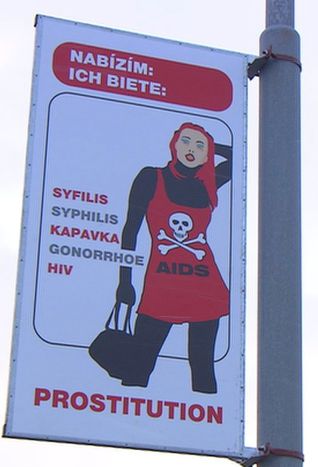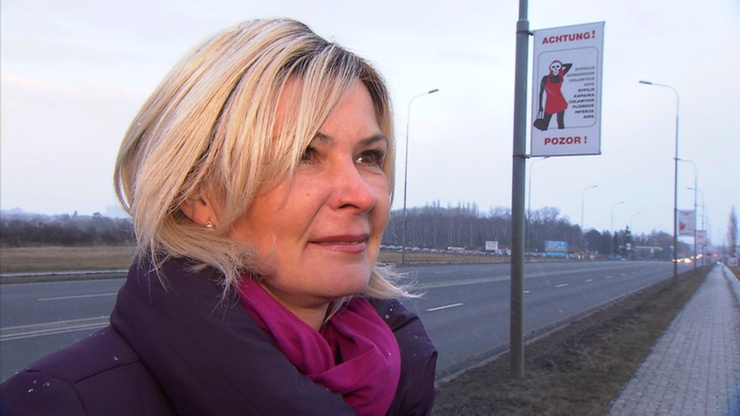
Chomutov, Czech Republic: fighting prostitution with posters
Published on
Translation by:
 Kimberly
Kimberly
Women wave in short dresses on posters at the main roads, created by Simona Kmonickova, who lives near the red-light district. Cross bones represent sexually transmitted diseases. The border to Sachsen isn’t far; most sex clients come from there, but despite the warning publicity, the problem has localised
Simona Kmonickovais a beautiful woman in her early forties, blonde, of medium height. Time after time men are mistaken about her because she is unfortunate enough to live at a street which was formerly one of the most famous promenades of prostitution. The Lipska Straße in Chomutov is an arterial road towards the north to the German border. The majority of their clients come to the red-light district in search of cheap sex, but that can be dangerous.
Posters of truth
The posters aim to calming the careless lust of the clients, with graphic warnings of sexually transmitted diseases. One poster depicts a cartoon woman in a mini dress, sometimes with a normal face, saying: 'I’ll give you syphilis, gonorrhea and HIV' in German and Czech. Other posters warn of crimes related to prostitution. In order to protect her three daughters, Simona would almost stoop to any level to see that prostitution disappears in the public.

It is a Friday evening and the 41-year-old is coming home from a dance lesson with her twin daughters Adela and Barbora. The seven-year-old twins, blonde like their mother, run to the couch and park themselves in front of the television. 'We used to live in a 'Plattenbausiedlung' (state-owned apartment complexes) and we were happy to leave,' says the mother. They moved into an 'Eigenheimviertel' (private neighborhood) on the northern edge of town, but the downside of the idyll soon appeared in the red-light district. 'I never felt safe here,' admits Simona; she was once asked for how much money she would be willing 'to do it'. Since then she has worried about her daughters, the eldest who is now sixteen, but especially about the younger ones. 'I take them everywhere, to school, home and to the lessons in the afternoon.'
Politicians in the Czech parliament have been blocking a modern law in favour of the legalisation of prostitution for years
Simona knows that others are responsible for this issue. In particular, politicians in the Czech parliament have been blocking a modern law in favour of the legalisation of prostitution for years now. The prevailing law dates back to the pre-war period when prostitution hadn’t been a topic yet. However Simona isn’t a woman who leans on others. She wants to do something about it. 'Everywhere people are promoting for all kinds of things, why can’t you draw the peoples’ attention to this problem?' she asks. The concept of threatening infections and STDs isn’t something that was just made up. Young women in the red-light district from Chomutov offer their services for not only very cheap, but they also do not use condoms. 'These diseases aren’t just arbitrarily picked, they have been diagnosed by doctors,' confirms vice-mayor Jan Rehak. He thankfully recognises the idea of those posters and contributed public money for the print. 'I was impressed by Mrs. Kmonickova’s suggestion,' states Rehak. 'The city has been trying to get a grip on the red-light district for years. Since we installed observation cameras and put pictures of the clients in their cars up on the internet, the number of prostitutes decreased immensely. Only four remain from twenty-two known women.'
Prostitution problem becomes private
Like the posters, the camera functioned as a deterrent for mainly German clients. But for a while now the police also started cracking down on the women too. 'The law enforcement is now encouraged to take every woman who offers intercourse publicly to the station in order to take a statement. If possible they are supposed to take them to the station that is the furthest away, in order to deter them away from 'work',' says Rehak. The changes can’t be missed, even if more than the four women mentioned previously by Rehak are standing outside in cold weather and are walking the streets. From the previously infamous Lipska-Straße', the women are almost all gone. The problem relocated to other streets though, but to a far less extent than two or three years ago.Nor is it an issue that can be solved entirely. The vice-mayor Rehak knows that prostitution is relocated to private areas, which makes it even harder to control them. He also thinks a legal law must be introduced in order to get down to the root of the problem.
The camera functioned as a deterrent for mainly German clients
Dusk has fallen in Chomutov. Adela and Barbora are watching a children’s programme whilst their mother cleans the table. Does she believe that her posters made a difference to the prostitutes? 'I don’t know, but I want them to go away, so that we can live a quiet life,' she answers determinedly. Then she pauses. 'But maybe they did change something. Here we also live true to the motto that what the eye does not see, the heart does not grieve over. Since those posters with dangerous diseases hang right in front of them, they might have realised how they are putting themselves and others in danger.'
An article by n-ost correspondent Steffen Neumann
Images: ©Steffen Neumann/n-ost
Translated from Deutsch-tschechische Grenze: Totenköpfe gegen den Straßenstrich


